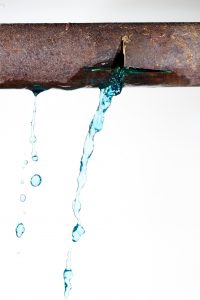
One of the most important services that our plumbers offer to customers in Silver Spring, MD and throughout Montgomery County is leak detection. The majority of the plumbing in your house is hidden from sight, and that makes it difficult to tell exactly where (or even if) a leak is occurring. It takes skilled plumbers with the right type of detection equipment to pinpoint where the leak is so it can be repaired or the pipe replaced with the least amount of damage possible.
One particular kind of pipe leak is especially tricky to locate and fix: the slab leak. This refers to a pipe leak in the concrete foundation of a home, either in the cold water or hot water lines. (About 80% of the time the leaks are in the hot water lines.) These leaks not only waste a significant amount of water, but they can also lead to structural damage to the house and the development of harmful mold and mildew. Leaks in the hot water lines also lead to the water heater wasting power.
Our plumbers use special equipment such as listening discs, ground microphones, and thermal scanners to find where slab leaks are happening. Fixing a slab leak sometimes involves using a jackhammer to reach the pipes, but less invasive methods such as lateral digging to create a bypass pipe are often possible.
But Why Are These Buried Pipes Leaking in the First Place?
Isn’t a pipe that’s placed down in thick concrete protected from damage? Not really. There are a number of different causes of pipe leaks down in the foundation of a house:
- Abrasion: Pipes sometimes rattle around as water moves through them. This is not so much because of the movement of the water; it’s the change in temperature causing the pipe to expand and contract. This motion can make the outside of the pipe scrape against the concrete, abraded it until it wears away enough for leaks to start. This is one of the reasons that hot water slab leaks are more common: the expansion from heat causes these pipes to shift around more.
- Corrosion: Older homes have pipes made from metal that can corrode. And this includes copper, which is corrosion resistant—not corrosion proof. Chemical in the water can trigger corrosion, as can contact with wires that create electrolysis in the pipe. In some cases, it’s a better long-term solution to have repiping done rather than the leaks repaired.
- Ground shifting: A foundation for a home isn’t as stable as you might think. We don’t have earthquakes here like in California, but all it takes is storm weather to shift the soil just enough that the foundation will place pressure on a pipe and break it. This can also occur because of construction mistakes. This kind of slab leak is often the worst since it can cause extensive flooding.
If you have any reason to suspect that there’s a slab leak in your house (high water bills, cracks in the basement floor, odd behavior from the water heater) you only need to contact our plumbers for the repairs that will take care of it.
Mallick Plumbing & Heating is the Service Contractor of Choice! We’re here for all your plumbing needs in Silver Spring, MD.
